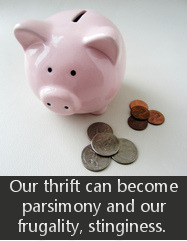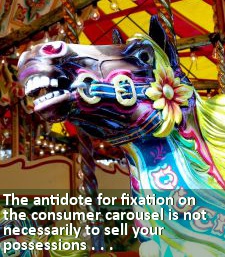“How does the mind relate to the brain? This question is central to my professional life.”
Body
More Than Material Minds: “As a Christian and a neuroscientist, I keep learning that to be human is to have a soul.”
As iron sharpens iron,
one person sharpens another. (Proverbs 27:17)
More Than Material Minds: “As a Christian and a neuroscientist, I keep learning that to be human is to have a soul.”
“In place of religion, we now have spirituality (or pseudo-spirituality). Instead of church, we do elaborate #selfcaresunday rituals. We get baptized at Burning Man. We pay tithings to yoga studios. Wellness has in many ways become our new religion, with practitioners, instructors, and coaches its priests, imams, and rabbis.” - Quartzy
“[T]here are many similarities between the materialism of ‘the rich’ versus ‘the poor.’ In both cases, their hearts are set on wealth. However, there is an important difference between the two: the rich have received their reward and their hope, whereas the poor have not.” Neither Poverty nor Riches
“I wonder if a more overlooked reason goes back to the idea that we want our children to like us and be our friends.” Intellectual Takeout
Posted by permission of Think on These Things and Voice.
“The power of the human mind to deceive itself seems infinite”1 The Greek philosopher Demosthenes said, “Nothing is easier than self-deceit. For what each man wishes, that he also believes to be truth.”2 In his confessions Augustine wrote, “Man’s love of truth is such that when he loves something which is not the truth, he pretends to himself that what he loves is the truth, and because he hates to be proved wrong, he will not allow himself to be convinced that he is deceiving himself. So he hates the real truth for the sake of what he takes to his heart in its place.”3
The fact that we are easily self-deceived should surprise no Christian for, as the inspired prophet Jeremiah wrote centuries ago, “The heart is more deceitful than all else and is desperately sick, who can understand it” (Jer 17:9)? Jeremiah quickly adds, I, the Lord, search the heart and I test the mind, even to give to each man according to his ways, according to the results of his deeds.” (v.10). However, this deceitful heart, which each of us inherits as a result of the fall, leaves us in a bit of a quandary. How are we supposed to function so as to walk authentically before the Lord? If even the best and most sincere can be deceived by their own hearts, then how can we have confidence that any of our actions, thoughts or motives are pure? How can we be sure that we are not deluding ourselves no matter how hard we try to live in integrity?
 (From the archives. Originally posted in June of 2011 as “Materialism: It’s Probably Not What You Think.”)
(From the archives. Originally posted in June of 2011 as “Materialism: It’s Probably Not What You Think.”)
Ask most people to describe materialism and you’ll hear references to big screen TVs, computers, SUVs, big houses and overpaid CEOs. A few might mention “consumerism” and “greed.” Most would agree with the idea that materialism has been a major obstacle to relieving world poverty. Some would say it’s the cause of that poverty.
But what if materialism isn’t really what most people think? We could fall prey to materialism unawares or reject good ideas we have misidentified as materialism. In seeking to help the poor, we could waste our efforts opposing what really contributes little to the poverty problem.
So what is materialism? I’ll pursue a definition by countering four popular myths.
A widespread attitude, especially among Christians, is that materialism involves attaching value and importance to material things—and that these things are not truly important.
But wouldn’t that make God the first materialist?

If you’re not among the mommy set, you may not have heard about Hattie Garlick, the UK mom who has vowed not to spend a single pound on her two-year-old son for the next year. Hattie’s decision is part social rebellion, part necessity. She credits a growing distaste for “kiddy consumerism” and the fact that she was recently laid off (or as our British cousins say, “made redundant”). Ultimately, her decision is rooted in the ideas of minimalism and thrift—that we don’t need what everybody says we need and what we do need, we can find more cheaply.
I know a bit about this kind of counter-cultural lifestyle. I grew up in a family of seven with an extremely limited income. We gardened, canned, and wore hand-me-downs, not because my parents were making a public statement, but because they were trying to clothe and feed us. Even today with a smaller family and a decidedly larger income, I still buy most of our clothes at Goodwill, we hunt, garden, and can, and my idea of a good time is shopping at Aldi. And yet, even I am skeptical of frugality for frugality’s sake. (If I’m honest, I suppose I’m also a bit of a curmudgeon. Whenever being counter-cultural becomes trendy, I immediately get suspicious—I don’t make a very good hipster.)
Because even while those of us enmeshed in consumerism might need to cut of our hand to save our souls (Matt. 5:30), minimalism can have as many pitfalls as materialism. It’s entirely possible to trade consumerism for a Gnosticism that elevates efficiency and thrift above everything else. Just because we might be counter-cultural doesn’t mean that we don’t have our share of sub-cultural baggage. See if any of this luggage is yours:
 Ask most people to describe materialism and you’ll hear references to big screen TVs, computers, SUVs, big houses and overpaid CEOs. A few might mention “consumerism” and “greed.” Most would agree with the idea that materialism has been a major obstacle to relieving world poverty. Some would say it’s the cause of that poverty.
Ask most people to describe materialism and you’ll hear references to big screen TVs, computers, SUVs, big houses and overpaid CEOs. A few might mention “consumerism” and “greed.” Most would agree with the idea that materialism has been a major obstacle to relieving world poverty. Some would say it’s the cause of that poverty.
But what if materialism isn’t really what most people think? We could fall prey to materialism unawares or reject good ideas we have misidentified as materialism. In seeking to help the poor, we could waste our efforts opposing what really contributes little to the poverty problem.
So what is materialism? I’ll pursue a definition by countering four popular myths.
A widespread attitude, especially among Christians, is that materialism involves attaching value and importance to material things—and that these things are not truly important.
But wouldn’t that make God the first materialist?
 If you are a typical, suburban American, you ride a wooden horse on the “consumer carousel.” And on this economic joy-ride, there is a place where we grip the pole with our left hand and reach out with our right to grasp a brass ring. Then, as our painted horse proceeds in a lazy circle to the accompaniment of festive music, we get another chance to grab another ring. And on this particular ride, the rings get bigger and better with each pass.
If you are a typical, suburban American, you ride a wooden horse on the “consumer carousel.” And on this economic joy-ride, there is a place where we grip the pole with our left hand and reach out with our right to grasp a brass ring. Then, as our painted horse proceeds in a lazy circle to the accompaniment of festive music, we get another chance to grab another ring. And on this particular ride, the rings get bigger and better with each pass.
On our first circuit we sign a lease on a modest apartment. The carousel slowly turns and with great excitement we return to the ring post and hook a starter home. On the next pass, we hope to grasp a bigger house in a better location.
On round one we dine at McDonalds and Dairy Queen. But as the carousel completes another revolution, we upgrade to Red Lobster and Olive Garden. On the next round we reach for a yet bigger and better brass ring, hoping to dine at exclusive restaurants with story-book names, opulent décor and white-capped chefs.
On our first pass we secure a used car. On the next round we get something “more reliable.” Another pass or two and we are reaching for that car or truck (or tank) of our dreams.
Life on the consumer carousel is all about upgrading. Each circuitous pass provides fresh opportunity to secure a bigger and/or better replacement of what we already have. Bigger and better shelter, higher quality food, more expensive clothes, better transportation, entertainment, appliances, furnishings, vacations, and on and on it goes.
Economic conditions among suburbanites in this country vary considerably. But we all have a horse on this ride. Admit it, there is something right now that you are hoping to replace with something more costly in the near future.
Discussion